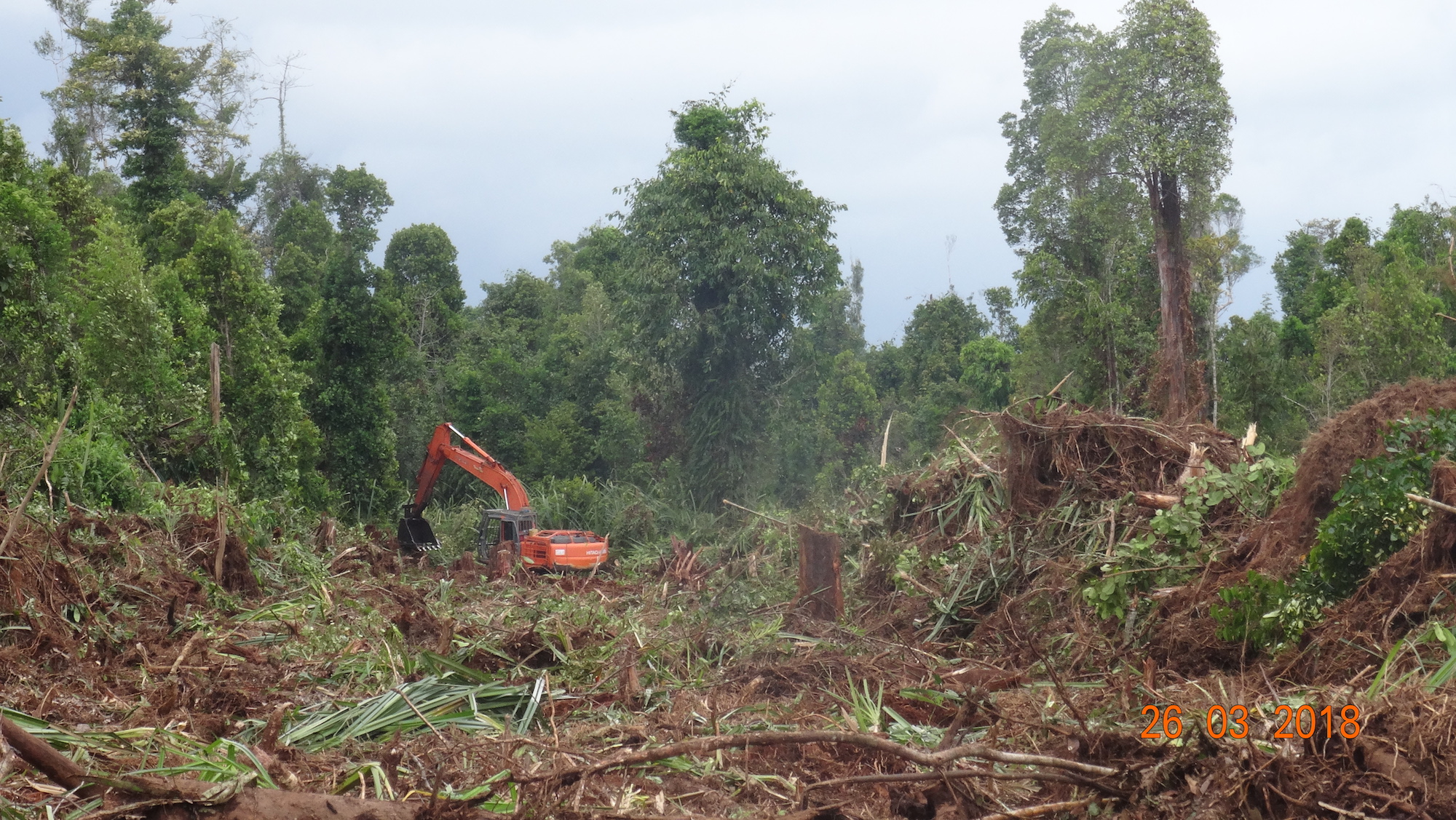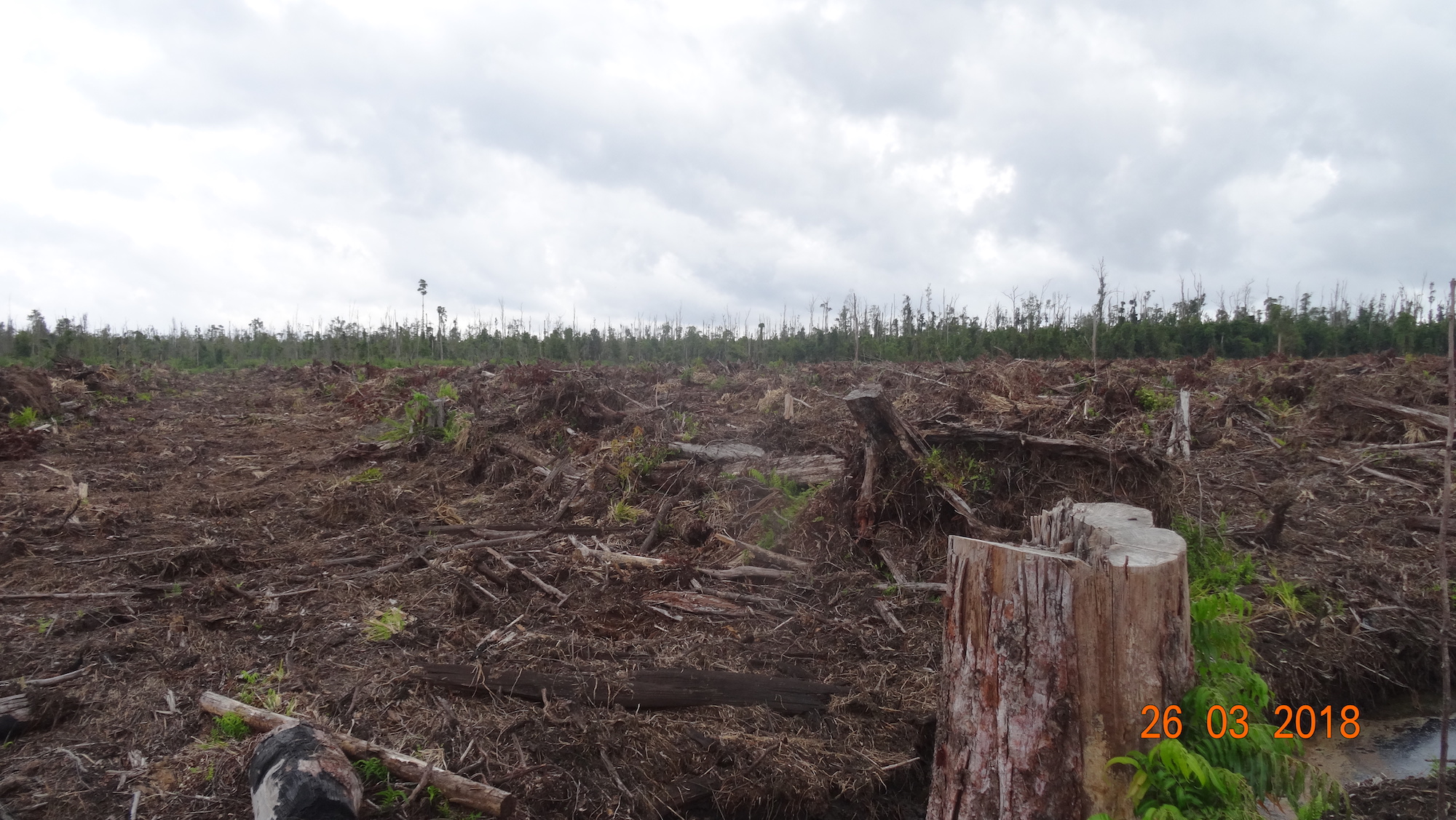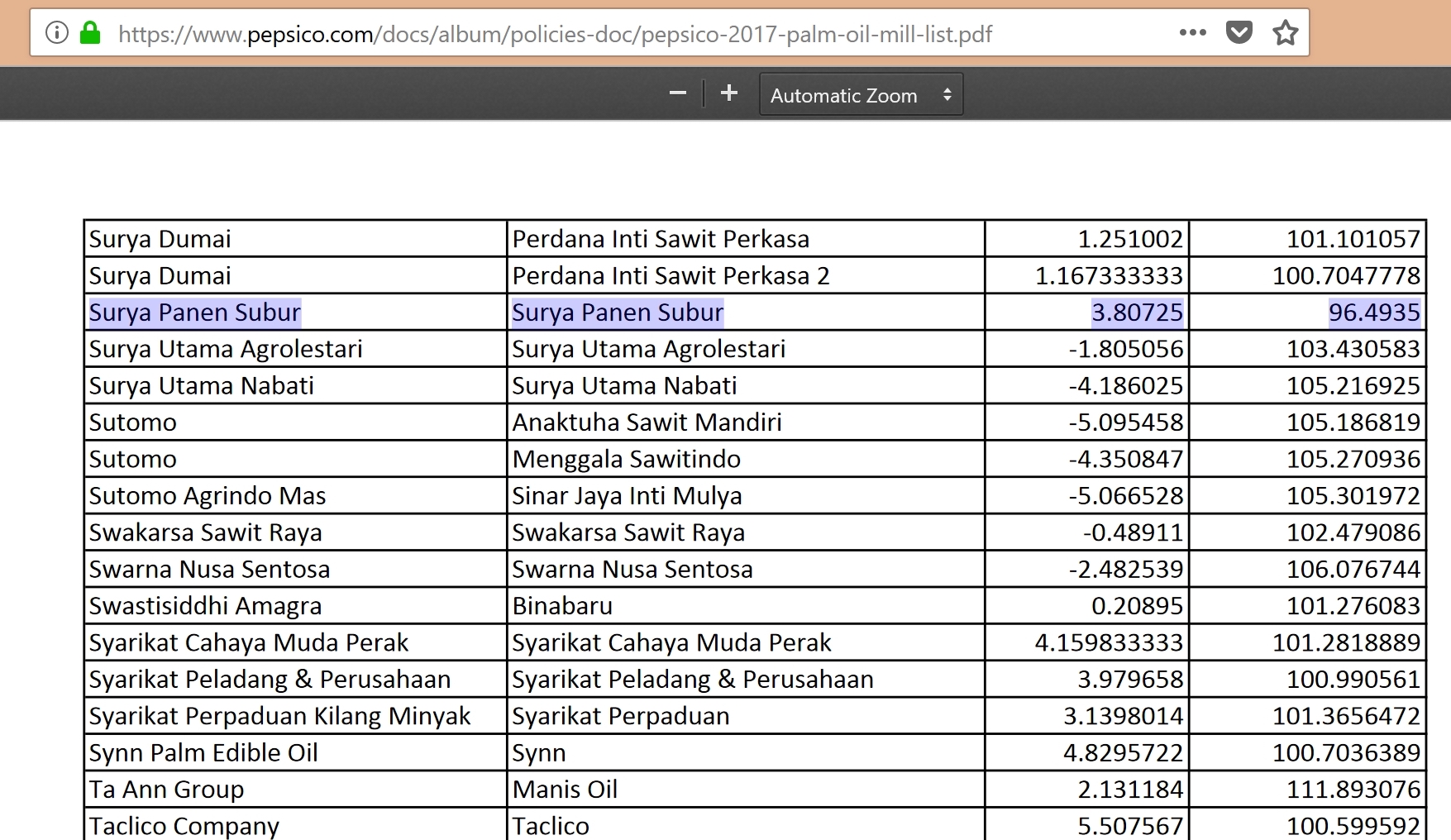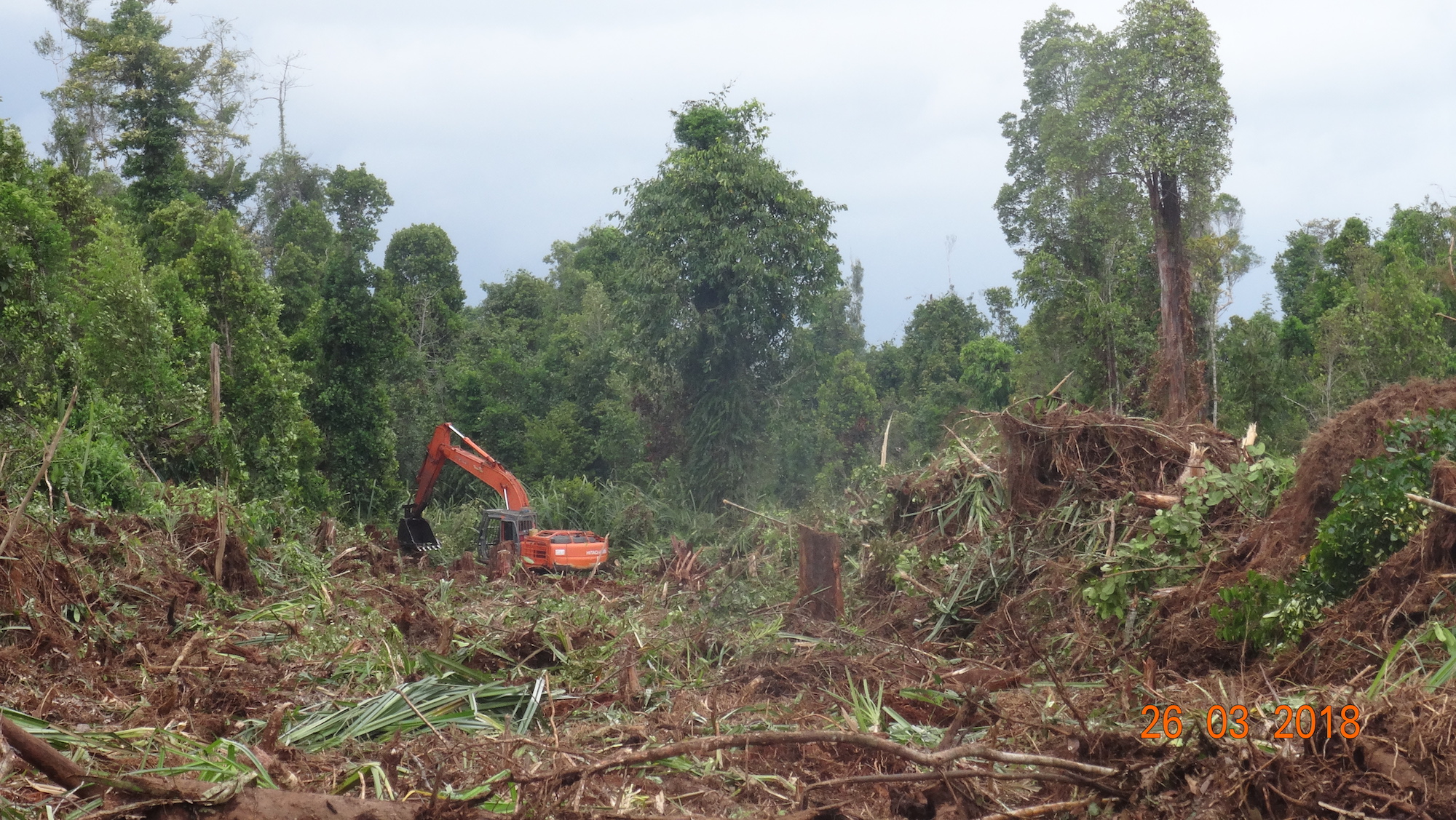*Deforestation updates through December 2018 at the end of the post*
GPS: 3°45’53.60″N 96°35’20.09″E
In January, March and April 2018, satellite monitoring and field investigations confirmed ongoing deforestation inside the PT Surya Panen Subur II (PT SPS II) concession, located in the Tripa peatland of the Leuser Ecosystem. PepsiCo and other brands are directly linked to this destruction and this new evidence shows that PepsiCo is failing to ensure deforestation does not enter its supply chain.
The Tripa peatland is located in the Leuser Ecosystem of Sumatra, Indonesia, and was once called ‘The Orangutan Capital of the World’ because its rich peat forests supported some of the densest populations of Sumatran orangutans. In addition to providing important habitat, the Tripa peatland’s waterlogged soils are a significant store of carbon and, when destroyed, release massive carbon pollution.
According to satellite analysis, a total of 84 hectares of forest have been destroyed in PT SPS II’s concession in the first four months of 2018. In January 2018 and again in March 2018, RAN field investigators found that heavy machinery was used to clear forests and additional areas were being prepared for new oil palm plantations including, in some cases, with the use of fire, an act that is against Indonesian law. Indonesia’s Minister of Environment and Forestry has also confirmed recent oil palm plantation establishment in areas of the concession that have been declared as peat protection zones by the national, provincial and district governments.

Heavy machinery operating in a forest area inside the PT SPS II concession in March 2018 (GPS: 3°45’53.60″N, 96°35’20.09″E).

An area of the PT SPS II concession that was cleared after the circular letter was issued to palm oil companies with existing concessions in the Leuser Ecosystem, March 2018 (GPS: 3°45’55.84″N, 96°35’31.82″E).
PT SPS II is one of the most notorious palm oil companies operating in the Leuser Ecosystem due to its long-term connections to the destruction of the Tripa peatland. PT SPS II was first exposed in the international spotlight in March 2012 when forests in its concession were on fire, contributing to a man-made inferno that burned through the Tripa peatland, sending thick plumes of smoke across Sumatra. Since that time, Rainforest Action Network (RAN) has exposed PT SPS II time and time again for ongoing forest destruction and peat drainage, including multiple instances in violation of the national moratorium on palm oil development. Since June 2016, when a government circular letter demanded that palm oil companies operating in the Leuser Ecosystem abide by the moratorium and halt forest clearance, a total of 368 hectares of forest have been destroyed inside the concession — roughly the size of 683 football fields. Furthermore, in April 2018, PT SPS II was found guilty by the State Prosecutor’s Office for having illegally cleared land in 2012 by setting peat forests on fire.
Snack food giant PepsiCo has been sourcing palm oil from PT SPS II and is responsible, in part, for the ongoing destruction of the globally important Tripa peatland. According to PepsiCo’s published mill list, the snack food giant has been sourcing palm oil from PT SPS II and its owner the Amara Group, further driving the demand for palm oil from this concession despite PT SPS II having been continually exposed as a bad actor.
 PepsiCo’s mill list with the PT SPS II mill highlighted.
PepsiCo’s mill list with the PT SPS II mill highlighted.
Since November 2014, RAN has been calling on the companies buying and trading palm oil from PT SPS II to end the demand for palm oil coming from Tripa and stop the burning and destruction of the remaining 4,000 hectares of forested peatlands within PT SPS II’s concession. For nearly four years, PepsiCo and other brands have failed to intervene and suspend sourcing from PT SPS II.
PepsiCo adopted a Palm Oil Specific Commitment in 2015 stating that the palm oil PepsiCo sources through its suppliers would be produced with no further development of High Carbon Stock (HCS) forests or High Conservation Value areas and no new conversion of peatlands. This case shows that, to date, PepsiCo has failed to enforce an immediate moratorium on deforestation and peatland destruction or publicly report on actions it has taken to address its role in the destruction of the Tripa peatland, and the priceless lowland rainforests in the Leuser Ecosystem. Sourcing from PT SPS II and other mills located in and around the Tripa peatland is in contradiction to the company’s Palm Oil Commitment and Land Policy.
In addition to PepsiCo, there are a number of other brands that are exposed to palm oil from PT SPS II in their supply chain including Unilever, Nestle, Mars, Mondelez, General Mills, Procter & Gamble, Colgate Palmolive, and Reckitt Benckiser.
PT SPS II remains one of the most controversial palm oil companies operating in the Leuser Ecosystem. If PepsiCo and other brands want their customers to believe that they are taking action to implement their own sustainability policies, it’s time they sever ties with PT SPS II until a lasting solution to the destruction of the Tripa peatland is achieved.
PepsiCo and other brands, and their suppliers, must immediately suspend sourcing from PT SPS II, and its parent company the Amara Group. This suspension must remain in place until PT SPS II establishes a transparent, credible and independent conflict resolution process to resolve conflicts with local communities and stop the destruction of the Tripa peatland.
For more information, see the case study here.
Update June 2018: Between April 17 and May 11, 2018, an additional 34 hectares were cleared inside the PT SPS II concession. A total of 402 hectares of forest have been cleared since the June 2016 government circular letter.
Update December 2018: An additional 90 hectares of forests have been cleared inside the PT SPS II concession between May 11 and November 26, 2018, totaling 492 hectares of forest destroyed since the June 2016 government circular letter. This deforestation has also continued despite strict sanctions imposed on the company following an investigation into illegal peatland destruction by the Indonesian Ministry of Environment and Forestry.
